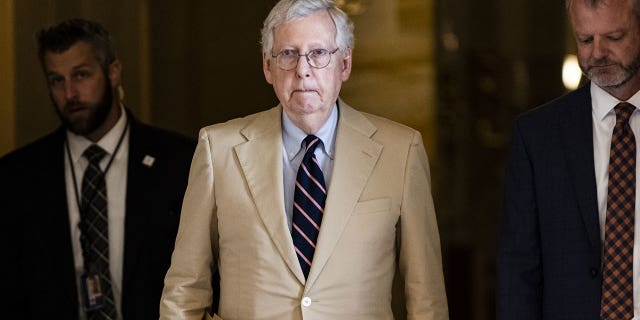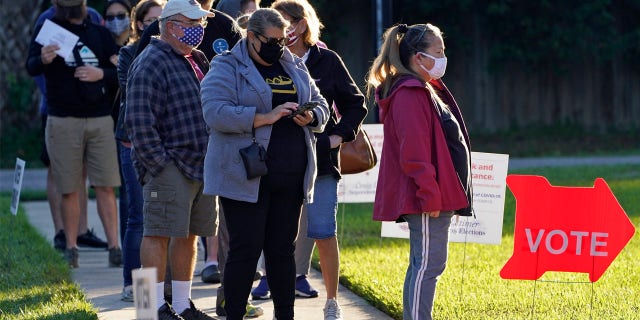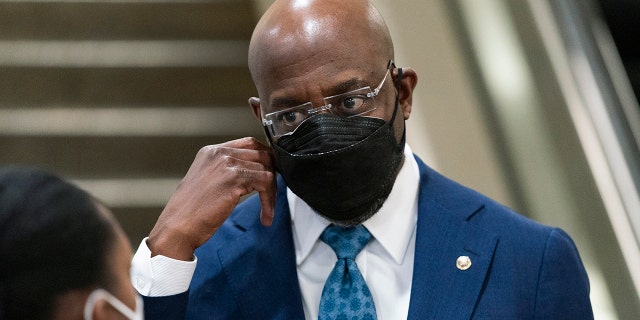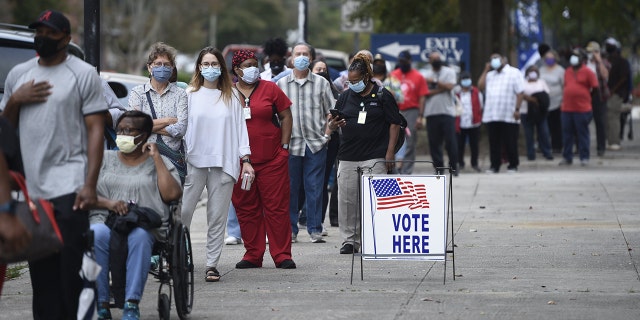Senate Republicans poised to block Democrats' sweeping election reform bill
‘No chance’ voting rights bill passes the Senate: Axios reporter
Axios National Political Reporter Jonathan Swan says sweeping voting rights proposal has no path towards legislation
A sweeping election reform bill that Democrats have pegged as their top legislative priority is expected to go down in defeat Tuesday in the Senate as Republicans are prepared to use the legislative filibuster to stop any debate on the For the People Act from going forward.
The Senate on Tuesday will take up a procedural vote on whether to advance the far-reaching voting rights bill that would set minimum federal standards for access to early and absentee voting as well as establish new ethics and campaign finance reforms that Democrats view as the civil rights issue of the era.
But Republicans are expected to deny Democrats the 60 votes necessary to move forward, dealing the majority a significant blow and putting any hope of elections reform in limbo.
Senate Minority Leader Mitch McConnell, R-Ky., rallied GOP opposition by dubbing the legislation a “radical” partisan “power grab” designed to stop states from running their own elections. He accused Democrats of trying to “rig the rules of American elections permanently, permanently in Democrats’ favor.”
“That’s why the Senate will give this disastrous proposal no quarter,” McConnell said Monday.
Senate Minority Leader Mitch McConnell, a Republican from Kentucky, walks toward the Senate floor at the U.S. Capitol building in Washington, D.C., on Monday, June 7, 2021. (Samuel Corum/Bloomberg via Getty Images)
Senate Majority Leader Chuck Schumer, D-N.Y., blasted Republicans for preventing a debate on voting rights from going forward and said the federal voting standards are needed as GOP legislatures around the country are passing “voter suppression laws” in the wake of former President Trump’s 2020 election loss and unsubstantiated claims of widespread voter fraud.
Schumer accused the GOP of being “afraid” to debate the merits of voting rights because they’d be forced to defend their efforts to disenfranchise voters.
“Republicans across the country are deliberately targeting all the ways that younger, poorer, nonwhite and typically Democratic voters access the ballot,” Schumer said Tuesday. “Republicans claim they’re making it easier to vote and harder to cheat in an election; but in reality, they are making it harder to vote and easier to cheat an election.”
The For the People Act legislation already passed the House with no GOP support. Democrats numbered the bill H.R. 1 to designate it as their No. 1 priority. But in the Senate, where Democrats control just 50 of the 100 seats, bipartisanship is needed to get anything passed with the 60-vote threshold in place.
The legislation had at least one Democratic opponent with moderate West Virginia Sen. Joe Manchin saying the bill was too partisan and he was still undecided midday Tuesday whether he’d vote in favor of the procedural motion. Manchin has sought unsuccessfully to court Republicans on his compromise effort, but that proposal won’t get a fair floor Senate debate with the GOP using the filibuster.
People wear protective face masks as they wait in line to vote at the Bell Shoals Baptist Church on election day Tuesday, Nov. 3, 2020, in Brandon, Fla. (AP Photo/Chris O’Meara)
Progressives and activists have ramped up pressure on the Senate to eliminate the filibuster so Democrats can pass such sweeping reforms with just a simple majority. But despite the GOP recalcitrance on federal voting reforms, moderate Democrats like Manchin and Arizona Sen. Kyrsten Sinema still doubled down on their opposition to eliminating the filibuster to bypass Republicans altogether.
“To those who want to eliminate the legislative filibuster to pass the For the People Act (voting-rights legislation I support and have co-sponsored), I would ask: Would it be good for our country if we did, only to see that legislation rescinded a few years from now and replaced by a nationwide voter-ID law or restrictions on voting by mail in federal elections, over the objections of the minority?” Sinema wrote Monday in an op-ed for the Washington Post.
That leaves Democrats at a crossroads on how to proceed, with Sen. Raphael Warnock, D-Ga., saying the issue of the constitutional right to vote is too important to let a filibuster get in the way.
“We’ve got to find a way to pass voting rights and I’m deeply committed to that,” Warnock said Tuesday. “And no Senate rule is more important than the Constitution.”
Sen. Raphael Warnock, D-Ga., right, talks to a reporter as he leaves the Capitol at the conclusion of the second day of the second impeachment trial of former President Trump, on Capitol Hill in Washington, Wednesday, Feb. 10, 2021. Warnock has made passage of the For the People Act a top priority. (AP Photo/Manuel Balce Ceneta)
((AP Photo/Manuel Balce Ceneta))
Some Democrats were counting on public pressure to shake loose some votes in the future.
Sen. Sheldon Whitehouse, D-R.I., told Fox News that Americans are broadly behind the major components of the For the People Act. “I like to believe that there’s always a way to make sure that the public will gets accomplished,” he said.
The voting rights legislation, if enacted, would take aim at big-dollar donors and dark money in politics by requiring additional disclosure of campaign donors and disclaimers on political advertising. Presidential candidates would also be required to release their tax returns.
In this Oct. 12, 2020, file photo, people wait in line for early voting at the Bell Auditorium in Augusta, Ga. The sweeping rewrite of Georgia’s election rules that was signed into law by Republican Gov. Brian Kemp Thursday, March 25, 2021, represents the first big set of changes since former President Trump’s repeated, baseless claims of fraud following his presidential loss to Joe Biden. Georgia’s new, 98-page law makes numerous changes to how elections will be administered, including a new photo ID requirement for voting absentee by mail. (Michael Holahan/The Augusta Chronicle via AP, File)
It would set up a new public matching financing system for congressional elections to encourage more grassroots donations and require states to adopt independent redistricting commissions to prevent partisan gerrymandering.
And the legislation would set basic standards for states to run elections, such as mandating at least 15 days of early voting, setting up automatic voter registration and permitting the use of student IDs or sworn written statements in states that have voter identification requirements.
Fox News’ Tyler Olson contributed to this report.
Source: Read Full Article







